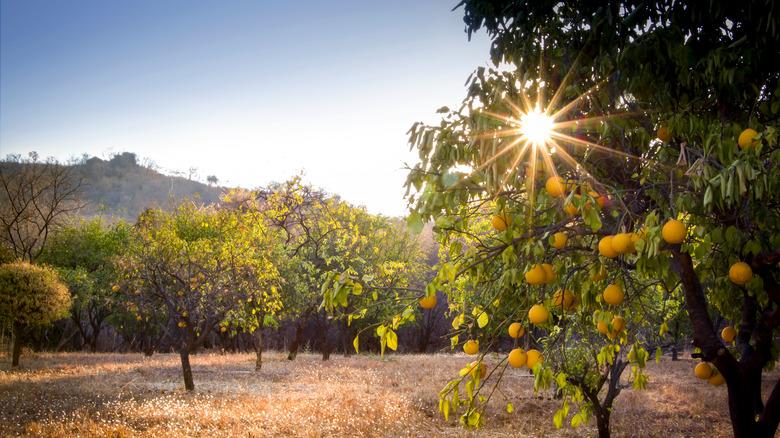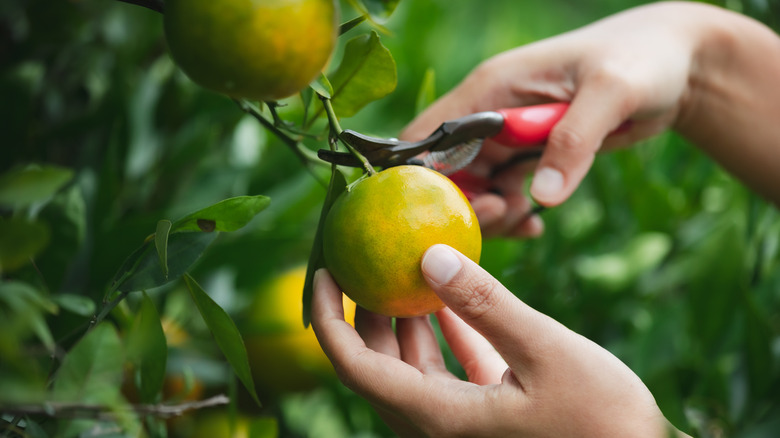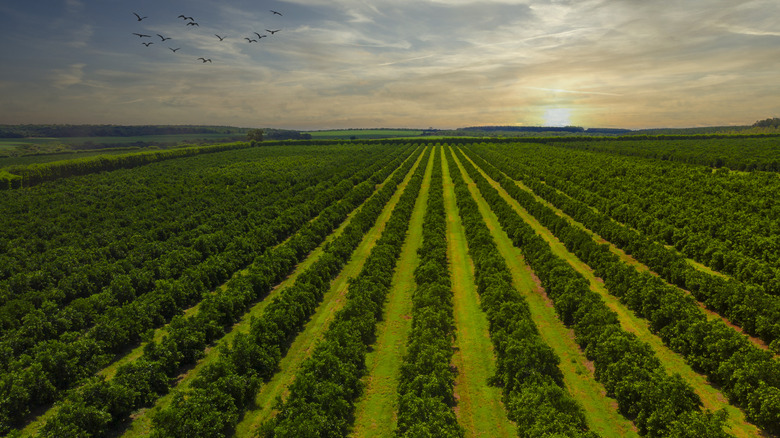Most Of The World's Oranges Come From This Country
Citrus fruit has always played an important role in world affairs. Lemons and limes have kept scurvy at bay from sailors, during the plague citrus fruits were used as a cure, and "Agrumed: Archaeology and History of Citrus Fruit in the Mediterranean" claims that ancient Indian, Egyptian, Greek, and Roman civilizations all lauded lemons and oranges for their health benefits and the spritz of flavor their skin and juice brought to meals. It's hard to imagine life today without citrus fruit being accessible, especially the orange which has become such a household breakfast staple over the past century.
Oranges were once quite expensive. As recently as the 1930s, oranges were bought only during the holidays with most of the populous only able to afford one or two of the fruits to give as gifts to only the most loved family members (via Under the Solano Sun). Thankfully, global enterprises have allowed the orange to be widely enjoyed in both the Northern and Southern hemispheres, and one of the countries responsible for making the orange so attainable is the South American country of Brazil.
Brazilian oranges
Brazil is an enormous agricultural producer. The country itself boasts 63.5 million hectares of farmland in use, with more land available for crop production if the need to expand occurs (via USDA). According to The Brazil Business, the country has something called the "Citric Belt" which involves a majority of São Paulo and west Minas Gerais. These regions are responsible for most of the over 18,400,000 total tons of oranges grown in 2020 , making it the top producer of the fruit in the world (via Food and Agriculture Organization). India is the second largest producer, but the country is quite far behind Brazil with over 10,860,000 tons produced in 2020. Thanks to recent data from the World's Top Exports, we also know that the largest orange importers in the last year were (in order) Germany, France, Netherlands, Russia, and China.
According to World Atlas, in addition to Brazil being the largest orange producer in the world, it's also the largest orange juice exporter and grows over 30% of oranges worldwide. All this being said, you may be surprised to learn that Brazil is not the orange's home country.
The history of oranges
Citrus fruits were brought to the Americas by Iberian conquistadores in the late 15th century and the fruit thrived in the climate, according to Gro-Intelligence. This is because oranges prefer to grow in temperatures between 70 and 80 degrees Fahrenheit as do other crops like sugar, coffee, and cotton, which were also grown on plantations as a way for European colonizers to turn a profit.
Brazil began exporting a significant amount of oranges in the 1900s, but before the fruit ever made its way to the New World, the orange was primarily an Asian delicacy. Story Maps claims that all citrus fruits are native to the Southeast Himalayan foothills in India and the northern Myanmar and western Yunnan of China and evidence proves that the fruit had been growing in these regions for about 8 million years.
It wasn't until the Islamic Conquests between 622 and 750 A.D. that the orange tree was spread across the rest of Asia, into what is now the Middle East, and into Africa and Europe. The orange fruit was not always of the sweet variety and was often used medicinally until the sweeter kind of fruit gained popularity and was then it was treated as a kind of specialty dessert. The juice, skin, and even the seeds of the orange to this day are used to make essential oils, pectin, and candy (via Britannica).
Nutrition of oranges
Throughout human history, oranges have been well-regarded for their health benefits. According to Healthline, oranges are basically a nutrient powerhouse. They contain massive amounts of vitamins B and C, minerals, fiber, and antioxidants. Eating oranges regularly will aid your digestion and immune system while helping to ward off heart disease, colon cancer, and obesity. It is a wonderfully beneficial fruit to consume. Times of India says that the orange is quite popular in Asia and is considered essential to a healthy diet. The site encourages the consumption of whole fresh oranges over drinking orange juice because a whole orange has more fiber and is more filling.
If you need help adding more oranges into your diet to give your body that extra nutritional boost, don't worry, Have A Plant has a handful of suggestions. The site recommends topping your regularly scheduled dessert with oranges, chopping some oranges into your homemade salsa, garnishing your breakfast oatmeal with fruit and some nuts, mixing up a fruit salad, or making a charred citrus salad recipe for a sweet kick!



